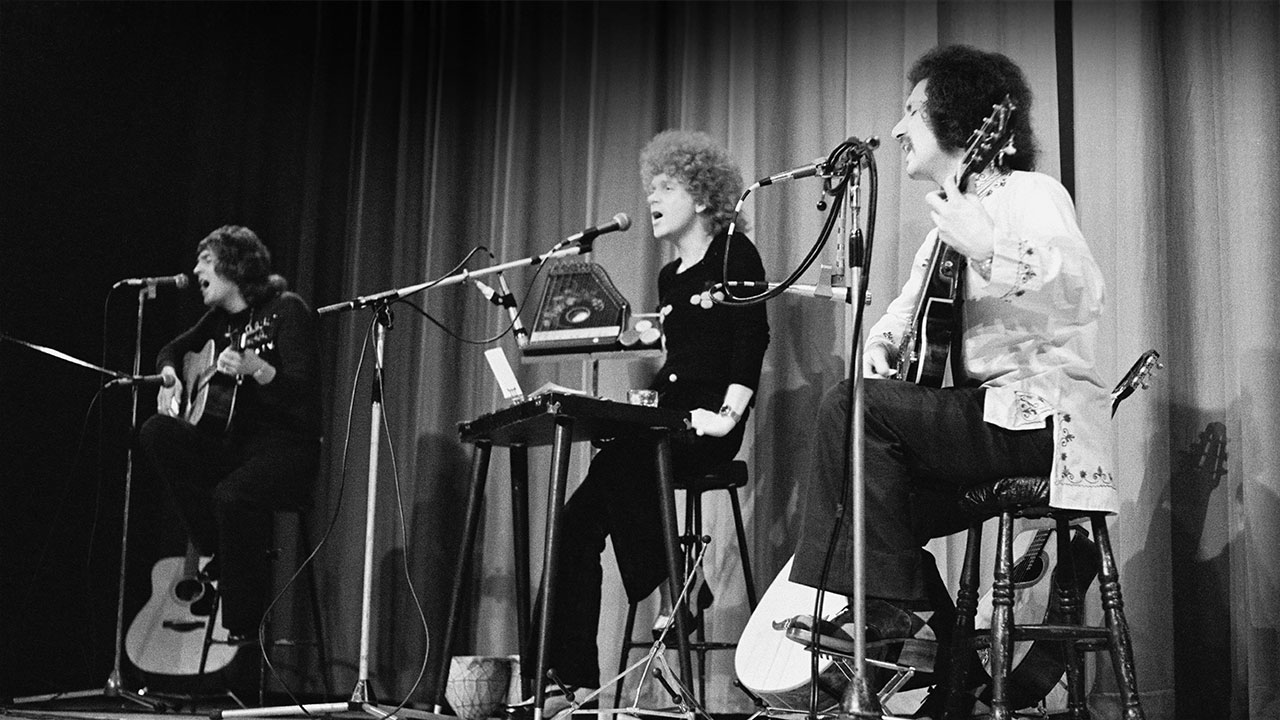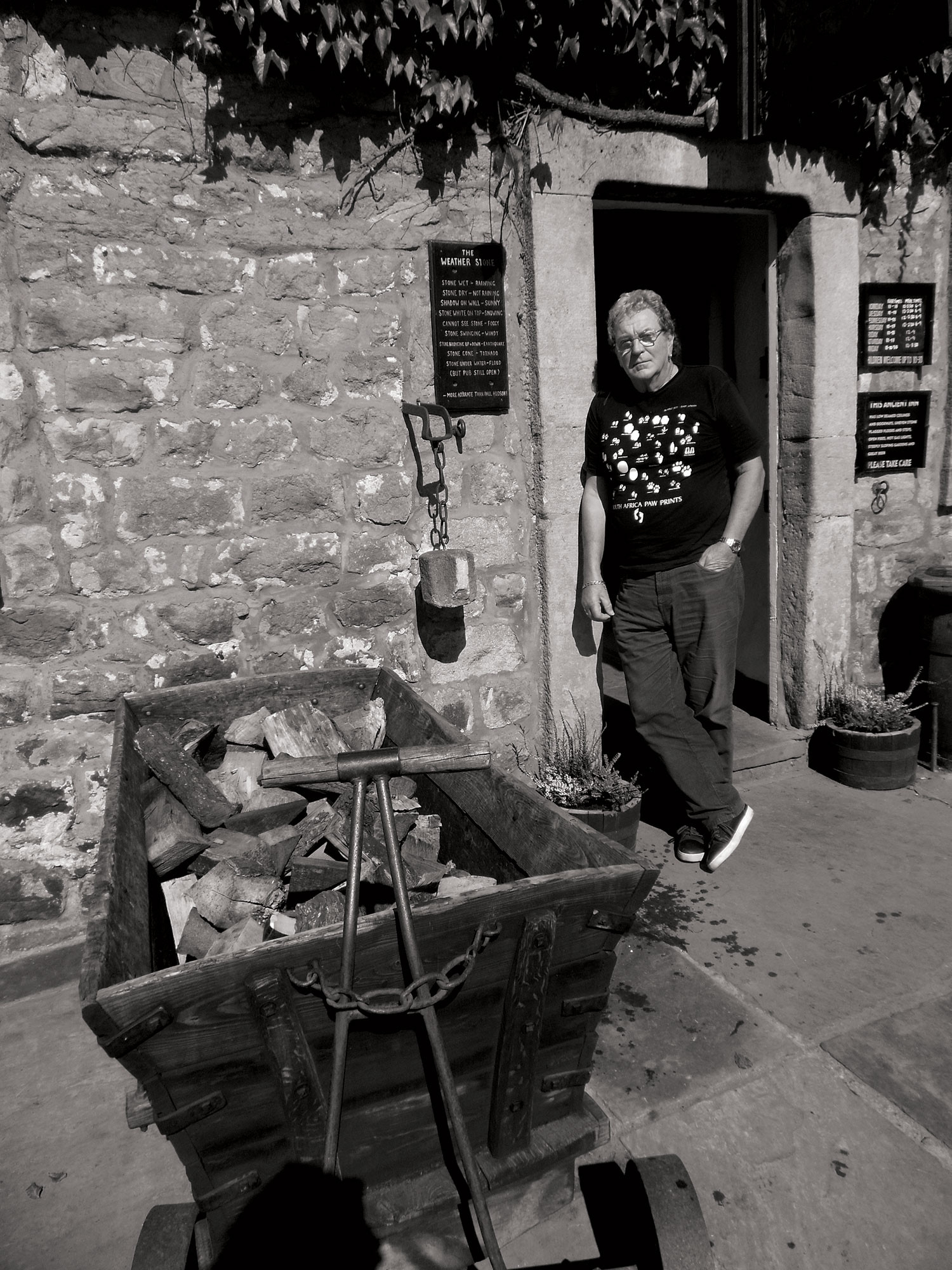
Where improbable tales from rock’s annals are concerned, Magna Carta’s story fits the bill. They had encounters with ghosts, David Bowie and human entrails; and gigs in the Gaza Strip, Kathmandu and even the Amazon Rainforest. “I look back and think: how did it all happen?” says the group’s amiable linchpin Chris Simpson. “It does seem like a bit of a dream.”
Eighty-one in July, Simpson is chatting to Prog from his home in Huddersfield, West Yorkshire. Upbeat despite a nasty cough and recent bouts with Covid and pneumonia, he reports, “It’s a lovely snowy morning, and adds that he’s “currently lying down”. Mention Magna Carta’s 1970 prog-folk masterpiece Seasons, or even 1973’s Lord Of The Ages – “One of the greatest albums of its kind ever made,” Rick Wakeman has averred – and Simpson’s natural ebullience grows. Magna Carta remain a cult band, and having led them for more than five decades he seems delighted that someone still cares.
With the Australian-born Lyell Tranter on second guitar and former Z Cars actor
Glen Stuart on co-vocals, Simpson formed Magna Carta in Hampstead, north London in April 1969. His studies at King’s College had qualified him to be an Anglican priest, but taken with The Lovin’ Spoonful, Chuck Berry and folk luminaries such as Bob Dylan, Simpson effectively ‘defrocked’ himself and pursued music instead.
Today he speaks of the serendipity of that time, of how easy it was to meet like-minded people. Tranter, an able, classically trained player, left his phone number on a note he placed in Simpson’s guitar case at a party, while Glen Stuart – an Afghan coat-wearing, patchouli-oil scented singer with a four-octave range – was recruited via an ad in Melody Maker. A chance encounter with Radio Luxembourg’s Brian Shepherd led to the trio recording their eponymous debut album for Mercury, but not before a change of moniker.

“We were originally called Village,” explains Simpson, “but there was already another band of that name. I’d always loved English history and when I suggested the name Magna Carta Brian Shepherd said, ‘That’s it!’ He thought it would be easy to remember since everybody learns about the Magna Carta at school.”
Pentagle’s then-bassist Danny Thompson was a featured session player on Magna Carta. Extremely taken with the band, he even wrote the record’s sleeve notes.
“Yes, Danny was one of the fountainheads of our early success,” says Simpson. “He got us support slots with Pentangle and introduced me to [guitarist] Bert Jansch. We used to love going to their rehearsals, because they were organised alcoholic chaos!”
Simpson grew up in a 16th-century stone cottage in rural Nidderdale, North Yorkshire. Living without electricity, he loved to read by candlelight and works by Dickens, Steinbeck and Hemingway fired his imagination. He’s always remained immensely proud of his roots and locals he knew from childhood found their way into songs on Magna Carta’s debut. Old John Parker, for example, was actually about Albert Brown, a gardener who’d let Simpson smoke tea leaves in his pipe, while Emily Thru’ The Windowpane concerned a certain Agnes Herring, a lonely old woman Simpson encountered each day while briefly working as a postman.
“I’ve always liked old people and now I am one,” he says with a laugh.
More intriguing, though – and certainly more gruesome – is the story behind Ballad Of Francis Alabadalejo, a deceptively pretty waltz ornamented by Danny Thompson’s
able bass.
“Ah yes,” says Simpson. “Francis was a lovely, bouncy little Spaniard who used to chase after nurses when I worked as a post-mortem assistant at the Royal Free in London. We had to take bits of bodies, innards if you like, out of the morgue and across the road for disposal. Francis was a hospital porter, and one day a parcel he was transporting spilled open and out came heads, fingers, bits of this, bits of that. Poor Francis just screamed and never came back!”
In time, Magna Carta’s prowess as a live act won them other influential fans. A gig supporting Pentangle at London’s Lyceum Theatre early in 1970 proved fateful when audience member Gus Dudgeon – then fresh from producing David Bowie’s landmark 1969 single Space Oddity – expressed an interest in overseeing their second album, Seasons.
Featuring a young Tony Visconti’s string and brass arrangements, and recorded at Trident Studios, Seasons was a huge step up for Simpson and his bandmates, both sonically and in terms of its vision. All quaint narrative sections and sweet Simon & Garfunkel-like vocal harmonies, 22-minute opener Seasons was very much of its time: an innocent, yet strangely haunting pastoral piece with spacey, quintessentially English evocations of flora and fauna. Elsewhere on the album, a young Rick Wakeman contributed organ and piano.
“Seasons was a concept album about the changing landscapes on my beloved Yorkshire Dales,” Simpson tells Prog. “I wrote the lyrics on the backs of cornflakes packets that I turned inside-out. After our first, rather DIY album with Brian Shepherd, it was incredible to record where The Beatles had recorded Hey Jude.”
Visconti, in particular, got on swimmingly with Magna Carta.
“One day he invited us down to his amazing house in Beckenham,” says Simpson. “He wanted us to play for a friend of his. When we got there he said, ‘Don’t be disturbed if you see a young girl wandering across the lawn – she’s a ghost and she’s been here for years.’”
Visconti’s “friend”, meanwhile, turned out to be David Bowie accompanied by his then-wife, Angie.
“So we played Seasons for them, just two acoustic guitars and voices. After we’d finished, David said, ‘That was one of the most beautiful things I’ve ever heard.’”
One of the best songs on Seasons is Airport Song, a hit single in various territories, which worked its magic via a gossamer string-arrangement and sparkling flute motifs.
“Its horrendous original title was Heathrow Fogbound,” laughs Simpson, “but it turned out to be an important song for us.”
As with most bands, Magna Carta were soon subject to the first of many line-up changes. Simpson had been blown away by Davey Johnstone’s mandolin playing with Draught Porridge at The Cambridge Folk Festival, and after the gifted Scot played some session guitar and sitar on Seasons, he became the obvious choice to succeed an increasingly disgruntled Lyell Tranter, who would soon return to Oz.
When Tranter died in 2022, Simpson wrote touchingly about him on Magna Carta’s website, so naturally he treads carefully when Prog asks about Tranter’s leaving the band way back when.
“Lyell was a smashing guy and I loved him to bits, but there were a lot of reasons for his departure that I can’t go into fully. We weren’t earning much money, plus he had fallen for a lovely lady who said she was pregnant by him, but wasn’t. Let’s just say that there were other complications between Glen and Lyell as well…”
Meanwhile, Johnstone’s first album as an official member was 1971’s Songs From Wasties Orchard. It’s perhaps some measure of the Scotsman’s impact that it was named after the street in Long Hanborough, Oxfordshire where he was living at the time.
“Davey was a killer musician – still is,” says Simpson. “Plus now we had great three-part harmonies: listen to Time For The Leaving. Davey later got snapped up by Elton John, but boy, did we have a lot of adventures together in the meantime.”
Indeed they did. There was a performance of Seasons at the Royal Albert Hall with jazz musician John Dankworth, who had scored The Royal Philharmonic’s accompaniment; then at a theatre in Zwolle, Holland, poor Johnstone was electrocuted onstage and insisted he had to go “back out there right away”. And then there was a rambunctious, whisky-fuelled tour of Scottish castles while they were all recording music for the BBC “light entertainment” series Castles In The Air.
Equally memorable, perhaps, was the time Magna Carta returned to the RAH to support The Beach Boys. Fired up by his dad shouting encouragement from the crowd, Johnstone played a virtuosic banjo version of traditional Scots reel The Mason’s Apron, and The Beach Boys’ enraptured audience screamed for more.
“So we’re heading back for an encore,” says Simpson, “and suddenly we’re surrounded by The Beach Boys’ minders, these very big, very aggressive men.
The biggest one said, ‘If you get back up on that stage it’ll be the last fucking thing you ever do.’ I said [playfully], ‘There’s no need to be rude.’ He said, ‘I’ll be as rude as I fucking like. Now fuck off!’”
There isn’t space here to parse the many works that various incarnations of Magna Carta released between …Wasties Orchard and recent box set When All Is Said And Done, but one of the band’s most treasured chapters came in the early-to-mid 80s, long after their heyday. Approached by a representative of ambassadorial body The British Council at a folk festival in Norway, the group were pleased to hear of their “universal appeal”. But when a brigadier from The British Council phoned some weeks later they were surprised.
“He was a very clued-up man, actually,” he says. “I realised later he was screening me very carefully. He said, ‘How do you chaps fancy playing in the Himalayas and Bangladesh, then on through the rest of the Indian subcontinent?’ He thought we might be busy and I didn’t say that we weren’t, of course. I remember he finished with the wonderful phrase, ‘Don’t worry, we’ll pay your train fare.’”
Magna Carta ended up doing 29 tours with The British Council. They played in Nicaragua, Venezuela and the Amazon Rainforest, and Chris shared a pot of Turkish coffee with Yasser Arafat on the Gaza Strip.
“What a sad situation that was,” he recalls. “I saw people being treated very badly.”

And what of now, wonders Prog? It’s late in the day, but it was only last autumn that the current Magna Carta line-up’s sold-out dates in Holland resulted in a series of standing ovations. Is there time for one last hurrah?
“Well, me and my wife Cathy will be spending the weekend on our narrowboat
on the canal at Skipton [North Yorkshire],” teases Simpson, laughing then wheezing, but I’m not closing the door. The problem is I can’t play guitar like I used to. I’ve got arthritis and I’m very achy. Plus getting Covid then pneumonia was a bit of a bugger, believe you me.”
Prog lets the weight of that statement settle for a second, then assures Simpson that it’s been a great privilege talking with him.
As for Magna Carta’s legacy, how does the musician hope his lifelong pursuit will be remembered in the future? “As one of the best bands in the world, both lyrically and musically,” he says assuredly. Amen to that.
This article originally appeared in issue 138 of Prog Magazine.







